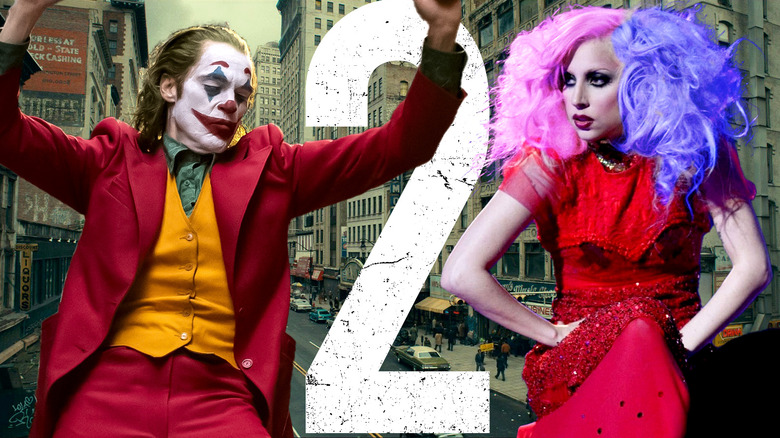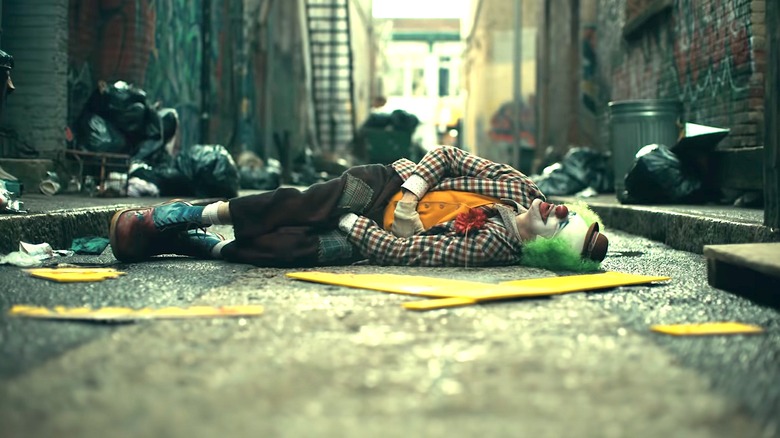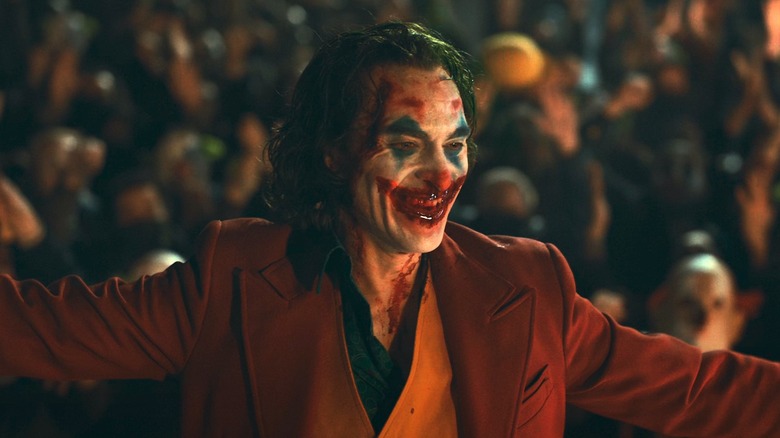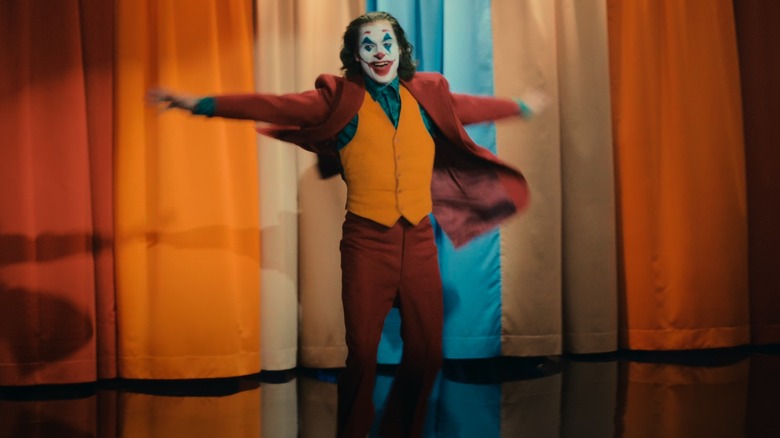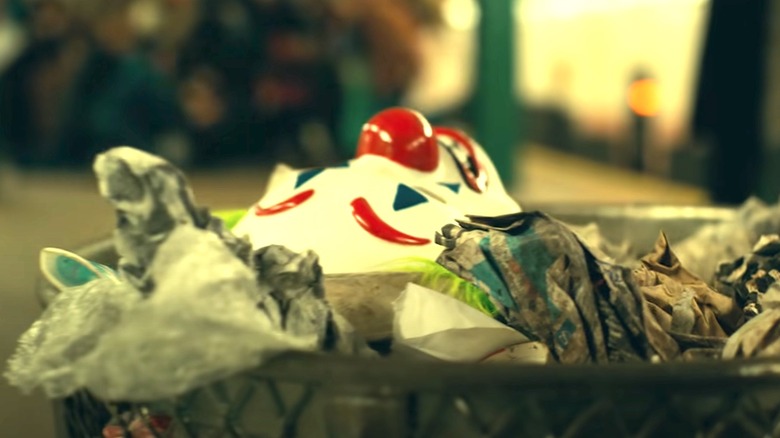Joker 2 Will Disappoint Comic Fans, But Maybe That's What Todd Phillips Wants
"Uh, Murray? One small thing. When you bring me out, can you introduce me as Joker?"
That line is perhaps the most strikingly loaded bit of dialogue from Todd Phillips' anti-superhero opus "Joker." And it's all the more effective for the near-innocuous menace with which it's delivered. The name Joker indeed carries with it a few decades' worth of comic book baggage, as the character remains one of the best-loved villains in comics history. But in the context of the film, the chilling line also serves as the official introduction to Phillips' and Joaquin Phoenix's wickedly unique version of the beloved character.
There have been many, many Jokers, both good and bad, but it's safe to say this movie's grounded, uber-gritty take on the beloved "Batman" supervillain wasn't quite like any that had ever appeared in film, television, or even the pages of DC Comics, for that matter. And to the surprise of many, "Joker" went on to become not just a box office behemoth befitting its superhero origins, but a legit awards season player.
Less surprising? Phillips' version of Joker's origin proved pretty divisive among DC Comics die-hards who just didn't see much of the chaotic criminal mastermind they adore in Phoenix's fridge-dwelling, interpretive-dancing outcast. And yes, their relative disappointment is almost certain to continue with the "Joker" sequel, because Phillips clearly has no interest in "Batman" fan service, and all the fans hoping for this character to become the Joker of the comics are in for a hard landing.
C'mon guys, Phillips' Joker was never supposed to be THE Joker
It's surprising that some "Batman" fans still seem to think the upcoming "Joker" sequel might actually deliver a more comic book accurate version of The Clown Prince of Crime, particularly in light of the fact that Todd Phillips spent the entirety of the first film not doing that. It was kind of the whole point of the film, with Phillips and co-writer Scott Silver essentially setting out to explore the twisted psyche of the character in a world that wasn't so inherently comic booky. In doing so, they borrowed only the sparest bits of Gotham, and Joker lore, using them to piece together a version of each more in tune with the crime-addled metropolitan streets Martin Scorsese spent the early days of his storied career exploring.
Of course, for some — likely including Scorsese himself — that world erred a little too close in style and story to cinematic classics like "Mean Streets," "Taxi Driver," and "The King of Comedy." The comparisons are obviously not unfounded. But even in shamelessly "paying homage" to those far superior films, one has to admire the sheer audacity Phillips displayed in taking that approach with characters sprung from the pages of comic books. Narrative audacity aside, even "Batman" die-hards might agree that any comics accurate versions of those characters would've felt almost comically out of place in such a world.
Thus, the "Joker" character whom Phillips set out to depict in "Joker" was never, ever going to be the Joker. There's no reason to think that will change in the coming sequel.
Phillips just wants to watch the Joker's world burn
Joaquin Phoenix's Joker is, of course, still the Joker. At least as much as any particular version of the Joker can be considered the Joker. As any fan of the character can attest, his story is about as set in stone as an etch-a-sketch, changing dramatically with every iteration conjured for screen, or page. As the likes of Tim Burton's "Batman," Christopher Nolan's "The Dark Knight," and even "Gotham" have proven, it's that you can do pretty much whatever you want with Joker's origin story. Such is the genius of the character.
Todd Phillips took a few more liberties than most in developing the story of societal outcast turned murderously delusional class warrior Arthur Fleck. While not all of the changes worked, a lot of them were arguably for the better, grounding the character in a relentlessly grim, yet hyper-realistic version of Gotham in which, from a purely logical standpoint, the presence of a Joker makes way more sense than that of a Batman. And opting to trudge through a crime-addled Gotham with nary a Batman in sight proves Phillips went into the production with zero interest in obeying established canon.
The director confirmed as much during an 2019 interview with Empire, admitting he was more excited to explore a world in which a character like Joker could realistically come into existence. In doing so, Phillips gleefully burned most of the pre-established lore surrounding Batman, Gotham, and Joker to the ground. Even as that fire still burns, Phillips is sure to fuel the flames further when his Harley Quinn debuts in the "Joker" sequel.
Joker 2 will be even less beholden to source material than its predecessor
Tentatively subtitled "Folie à Deux," the "Joker" sequel will indeed feature the Clown Prince of Crime's main squeeze Harley Quinn, with Lady Gaga tapped to play the role opposite the returning Joaquin Phoenix. Continuing that story pretty much demands that Todd Phillips put his own spin on Harley for "Joker 2." And it's safe to say fans have questions about what he's got in store for the character when she meets the clown-faced killer formerly known as Arthur Fleck.
The film's subtitle (which translates to "madness of two") alludes the pair may indulge in some vintage Gotham-set chaos. Given Phillips' proclivity for riffing on, or simply ripping apart "Batman" canon, the likelihood we'll see a traditional version of the crime-loving power couple is quite slim — though it seems possible their relationship could still begin in the well-established doctor-patient capacity. From there, however, we should expect Phillips to selectively include only the parts of Harley's story that work in his version of the story. That will no doubt rub many comic book purists the wrong way.
That's even more true these days as Margot Robbie's show-stopping work as Harley in recent DC projects has made the character more popular than ever. But any expectation those newfound Harley stans have about seeing more of the plucky, ass-kicking antics of Robbie's bubbly anti-hero will be undoubtedly be dashed in "Joker 2." Because if "Joker" taught us nothing else, it's that Phillips doesn't just want to subvert such expectations — he seems to get a legitimate kick out of doing so. When he does it right, it can be profoundly effective.
Subversion will remain the name of Phillips' Joker game
Despite some eventual backlash, Todd Phillips miraculously managed to escape the wrath of online fandom with "Joker," a film that earned more than $1 billion at the box office, and scored a whopping 11 Academy Award nominations. Such head-spinning success has probably only encouraged Phillips to further subvert with "Joker 2: "Folie à Deux" — a theory bolstered by the fact that the film will reportedly be a musical.
Now, the idea of a Joker and Harley Quinn musical should be intriguing enough to earn interest from even the staunchest of "Joker" haters. But it proves Phillips is probably indulging more than ever in his "anything goes" mindset with the character. Whether you loved or loathed the practical ways in which he began that journey in "Joker," it could be argued the crux of his origin story is more compelling than any toxic-waste silliness conjured in the pages of DC Comics. Given the ongoing struggles for mental health awareness in America today, Phillips' socially conscious read on the subject, and the violence it sometimes triggers, remains timely to say the least.
Nonetheless, Phillips seemingly goes a bit overboard by the end of "Joker," essentially proselytizing the murderous character of title to the point of making him an anti-hero instead of a villain-in-the-making. Then again, that may also have been by design. Because Todd Phillips went into "Joker" looking to turn Batman canon on its pointy-eared head. And anyone expecting him to walk back that approach with "Joker 2" is setting themselves up to endure a folie à un.
